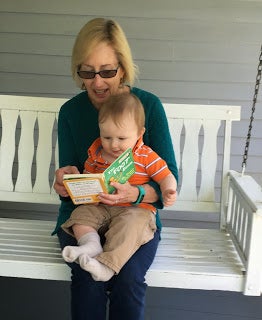
As a brand-new grandmother, Susan Hull has really begun to appreciate on a whole new level just how early literacy development starts in a child.
Her baby grandson reminds her every day about the important role that reading has always played in her family. “We just assumed you would read,” she remembers, “and of course we would read to you, and of course there’d be books and newspapers and conversation.” Reading baby books to her grandson has also sharpened her focus on how that assumed introduction to reading “doesn’t happen for all kids.” To Susan, Literacy First’s tutoring in low-income schools is the perfect way to fill this gap for students in families that can’t spend as much time concentrating on literacy. (Or, in her own words: “I really, really like you guys!”)
Yet while reading books may always have been important to Susan, she originally became a Literacy First champion by way of math.
After 16 years of teaching high school mathematics, Susan began working toward her Ph.D. at the University of Texas and met Dr. Uri Treisman in the process. Professor Treisman had just founded the Charles A. Dana Center for Math and Science Education, a special research unit at UT focused on making sure that all children have access to high-quality education, and he recognized Susan’s combined passions for math and social justice right away. Instead of returning to the classroom after finishing her degree, Susan began lending her expertise to the Dana Center’s work in 1994—the very same year that Uri Treisman and colleagues founded Literacy First as a partnership between the Dana Center and AmeriCorps.
As a former Dana Center staff member, Susan brings a unique perspective to our invaluable group of donors. Over the 20 years that Susan spent at the Center, she cheered Literacy First on as our project grew into an increasingly bigger presence in Austin education. Yet even back in 1994, when Literacy First “was just a handful tutors and two or three schools,” Susan was impressed by the drive of the newly minted Literacy First personnel. “I swear the staff and the tutors were so dedicated and so convinced that they could make a difference in kid’s lives by teaching them to read,” she remembers with enthusiasm, “and they were right! It was just amazing.”
The Dana Center as a whole was growing, too, and that growth ended up cementing Susan’s affection for Literacy First. “The Dana Center started out working in Texas just with math and science education specifically,” she says, “but then we grew to have more of a national impact.” This broader and more high-level focus on national policy and state agencies, she says, sometimes had the effect of making her feel “farther away” from the individual kids whom the Dana Center’s work and research impacted. Literacy First’s locally-based program helped Susan to “stay grounded” because our method of teaching reading places such an emphasis on the progress of individual children. She appreciates how, in addition to providing hard data about our tutoring success, Literacy First also “shows us the kids, the faces and the names of students that we’re doing all this hard work for. And that’s important to remember, that it’s not just about the higher level, it’s also about the kids here at home.”
Though her own background and passion might center around the sciences, Susan has always felt an affinity for our literacy tutoring (and believes it to be a crucial component of the Dana Center’s mission) because she believes that reading is a critical skill for success in math and science. That’s particularly true in light of a newer state emphasis on word problems in math classes, she says, rather than sets of math problems presented to students without context. As she puts it, “You can’t do math without learning how to read. You can’t do science without learning how to read. It’s really, really important that students can read…and it’s got to start early.”
To Susan, getting children to grade level in reading by third grade is the first important step to fostering successful students in every subject and, beyond that, successful citizens: “You know what they’re learning here is going to carry over into lifelong learning and influence their future forever.” We might say the same thing for the Charles A. Dana Center’s programs—important work of which we are incredibly proud to represent just one piece.
